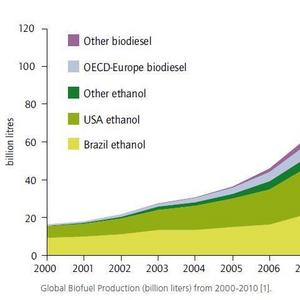WBA: enough land for more food, feed, biofuels




World Bioenergy Association
March 28, 2013
BY Anna Simet
There is enough land available to produce more food, more feed and more biofuels, which are not the cause of global malnutrition problems, according to the World Bioenergy Association.
WBA makes this declaration in a recently released, fourth publication of a series of documents intended for media and industry use as verifiable, easily-referenced sources addressing global bioenergy usage and potential.
The latest fact sheet, Biofuels for Transport, emphasizes that while the word population is growing annually by about 70 million people—while first-generation biofuel production continues to increase—the world hunger situation is improving. “40 years ago one quarter of mankind suffered hunger, in 2012 it was less than 15 percent,” the paper says. “There is no scientific evidence that global malnutrition has increased as the production of biofuels commenced and ramped up…biofuels are not the cause for the unsolved problem of the food supply for the poor.”
Advertisement
Advertisement
In 2010, about 84 million metric tons of conventional biofuels based on crops containing starch, sugar or vegetable oil were produced, representing 104 billion liters of fuel, or 2.7 percent of the global demand for transportation fuels, according to the WBA. While advanced biofuels will offer a big advantage—no direct competition with the food market—conventional biofuels cannot be replaced, the WBA says, as they are an essential pillar of the transformation of fossil-based transportation fuels.
On the effect of biofuel production on food prices, the paper says that while agricultural commodity prices have been fluctuating over the past decade and were particularly high in 2007-’08, a number of different factors have influenced them such as increasing fossil oil prices, bad harvests (as a consequence of extreme weather situations), growing demand of food for an increasing population with changing eating habits, slower improvements in productivity gains due to low investments in agriculture, and the production of biofuels, which WBA says has the most minor impact of those factors, citing that several studies also indicate that higher commodity prices have many positive effects in the global agricultural commodities market.
The paper also addresses the discussion of indirect land use change models, which WBA describes as “blunt tools that fail to capture the complex interactions between land use, food, feed and energy demands that form the reality we live in,” and argues that adoption of regional strategies to minimize emissions caused by land use change are a better choice than strict limitation of the demand for biofuels as is now discussed in Europe. “This will only serve to hamper the ongoing and necessary technological development of biofuel systems, increase overall greenhouse gas emissions and endanger the security of fuel supplies,” the paper says.
Advertisement
Advertisement
The WBA concludes that there’s a need for a continued, well-balanced further growth in the production of biofuels for transport, and calls for intensified efforts to achieve the market introduction of advanced biofuels based on cellulosic feedstocks.
Related Stories
The U.S. Department of Energy Bioenergy Technologies Office (BETO) announced up to $23 million in funding to support research and development (R&D) of domestic chemicals and fuels from biomass and waste resources.
The U.S. DOE has announced its intent to issue funding to support high-impact research and development (R&D) projects in two priority areas: sustainable propane and renewable chemicals and algal system cultivation and preprocessing.
Sens. Sherrod Brown, D-Ohio, and Pete Ricketts, R-Neb., in August introduced the Renewable Chemicals Act, a bill that aims to create a tax credit to support the production of biobased chemicals.
The Chemical Catalysis for Bioenergy Consortium, a consortium of the U.S. DOE’s Bioenergy Technologies Office, has launched an effort that aims to gather community input on the development of new biomass processing facilities.
USDA on March 8 celebrated the second annual National Biobased Products Day, a celebration to raise public awareness of biobased products, their benefits and their contributions to the U.S. economy and rural communities.
Upcoming Events










